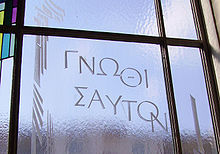Know thyself
Appearance

The Ancient Greek aphorism "know thyself" (γνῶθι σεαυτόν), is one of the Delphic maxims and was inscribed in the pronaos (forecourt) of the Temple of Apollo at Delphi.
| This theme article is a stub. You can help out with Wikiquote by expanding it! |
Quotes
[edit]- The great duty ‘know thyself,’ which sounds so important, has always seemed to me suspect, like a trick of priests in secret conspiracy who would like to confuse man through unfulfillable demands and lead him away from his proper activity in the external world to a false interior contemplation. A man knows himself insofar as he knows the world, which he perceives only within himself, and himself only within it.
- Johann Wolfgang von Goethe, Bedeutende Fördernis durch ein einziges geistreiches Wort, cited in Karl Löwith, From Hegel to Nietzsche, D. Green, trans. (1964), p. 10
- It seems that some people are not only misled themselves, they also seek to mislead those who listen to them. They speak as if there is only one kind of knowledge and claim this constitutes the aim of contemplation. Now here is a fact which will reveal to you something of the terrible depth of evil into which the worldly philosophers have fallen. The Evil One and his philosophers, who derive their skill in doing philosophy from him, have stolen one of our most useful teachings and use it as dangerous bait. Thus they identify our injunction be attentive to yourself (πρόσεχε σεαυτῷ, Deuteronomy 15:9, LXX) with their motto know thyself (γνῶθι σεαυτόν).
- Saint Gregory Palamas, Holy Hesychia: The Stillness that Knows God, as translated by Robin Amis (Praxis Research Institute: 2016), p. 34
- Only by knowledge of that which is not thyself, shall thyself be learned.
- Owen Meredith, "Γνωθι Σεαυτον" ("Know Thyself"), in The Poetical Works of Owen Meredith (1867), Vol. I, p. 247.
- πρόσεχε σεαυτῷ μὴ γένηται ῥῆμα κρυπτὸν ἐν τῇ καρδίᾳ σου.
- Take heed to thyself that there be not a secret thing in thine heart.
- Septuagint, Deuteronomy 15:9

